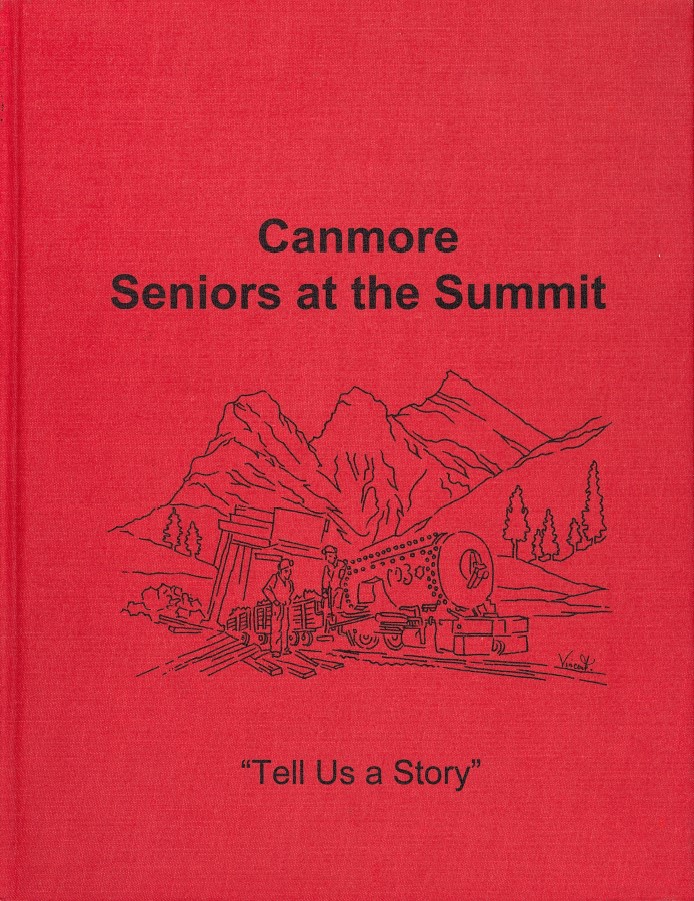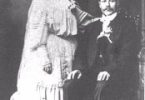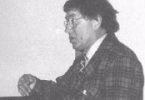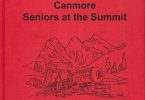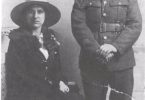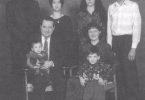By Georgina Stewart Heath Kluczny
Victor Spud Heath was born in the farmhouse at Iowalta, Alberta (Meadowbrook District) on May 24, 1915, to John and Ellen (Henesay) Heath. They had moved here from Canmore, their first stop after arriving from Wales, and lived here until Victor was about ten before moving back to Canmore.
Naturally, these farm years produced their quota of incidents. For example, at a very early age, Victor got hold of some matches and was playing with them in the barn. The inevitable happened – the barn was set afire. Still at an early age, Victor suffered a bee sting to his head one day. One of the effects was an onset of drowsiness. He wandered into the garden where the tall Meadowbrook potato vines provided the shelter for an extended nap in the spud patch. The family couldn’t find him for hours and, after this incident, he became Spud!
Then there was the broken arm, resulting from a fall from a horse. His older brothers were dismayed by the angle that the newly broken arm assumed, and, fearful that they would catch Hell when the accident was discovered, tried to pull the arm back into place. Needless to say, the impromptu efforts at bone-setting were a bit less than professional; in fact, they were more like Painful!
As a boy, Spud was usually tagged as “mother’s helper” – helping with the cleaning, scrubbing, and other household chores. How this happened with girls in the family is not too clear, but the pattern continued for years, even after the return to Canmore. There Spud was also required to deliver his mother’s sales of home baking – a job he strenuously objected to.
“Working out” began early in those days, and age thirteen, Spud was back to Meadowbrook where he worked at the harvest for Ron Spink’s dad, Jim. Pitchfork handles soon produced handfuls of blisters which took no time to become painful. Axle grease on the blistered palms produced a measure of relief, permitting the kid to carry on with the job. Spud stayed on for the winter and was impressed by the fact that Jim Spink fed the animals a double ration of feed on Christmas Day!
The “Dirty Thirties” were, of course, dirty in the Meadowbrook-Lacombe area as well as in the rest of the country. One of the ways of earning a few extra nickels of “cash crop” was to cut loads of firewood and haul it into Lacombe, where it was sold to the town dwellers, who still largely used firewood for fuel. The market, or at least the cash, for firewood was limited, though, and some Loads were hauled clean to Ponoka. Sometimes, even that did not work and the load would have to be hauled home again in the bitter cold. Those who have not experienced long trips in horse-drawn sleighs in mid-winter will probably never know the feeling of exhaustion resulting from the extreme cold and walking behind the loaded sleigh to try to keep warm. Dozing off could prove fatal!
One of the government’s “make work” schemes to provide winter employment was a plan whereby a farmer could hire a worker, provide him with room and board, and receive five dollars per month from the government. The worker would also receive five dollars per month in government money and, hopefully, would also get five dollars per month from the farmer. Spud worked under this plan in the Meadowbrook area “brushing” (clearing land) from daylight until dark, and usually it was for the five – not the ten – dollars per month. Wonder how today’s lads would budget five dollars per month!
Meanwhile, war clouds were gathering in Europe. Spud was now employed around Canmore, working for a survey gang around the mines. With the outbreak of the war, Spud tried to enlist in the army but was rejected because of flat feet. Persistence at the recruiting centre, though, finally got him a conditional enlistment – limited to service in Canada. He enlisted in Calgary on November 17, 1941. After basic training in Camrose, Alberta, he was assigned to RCASC – Royal Canadian Army Service Corps. He trained in that outfit at Red Deer and other locations, qualifying as a “fitter”, “motor mechanic” , and “driver”. He spent time in Hamilton, Debert, Lachine, and other Canadian bases. However, continued applications (constant bugging) for overseas postings eventually resulted in a posting to England. Further agitation got him a transfer to the Royal Canadian Regiment, an infantry outfit, and a trip to the Italian campaign. As a qualified Rifleman, he was sent into the campaigns in Sicily, Italy, France, Holland, Belgium, and Germany. His service medals included: Canadian Defense Medal (indicating service in Canada other than Basic Training); 1939-45 Star, Italy Star, France-Germany Star, and the Canadian Volunteer Service Medal and Clasp.
He was officially discharged on November 15, 1945. His service time was almost exactly four years. Spud served throughout the war as a private – with the odd temporary hitch as corporal when the need arose in the unit.
Back in Canmore, Spud began to work at Canmore Mines where he stayed for twenty years, ending with early retirement in 1965 as a result of a long series of circulatory problems. In the meantime, Spud became actively involved in the community, including Canmore Legion Branch #3. On December 27, 1948, he and Georgina Stewart were married in Calgary. They built their home in Canmore and son, Kevin Timothy, joined the family June 28, 1957.
Spud’s circulatory problems required considerable surgery and long sessions in the hospital. Much of this treatment took place in the Colonel Belcher Veteran’s Hospital in Calgary. After several years of these problems, Spud was claimed by a heart attack on July 7, 1973. He lies in Canmore’s Field of Honour.
Kevin Heath still lives in Canmore, though not in the same house, and is currently employed at the lime plant in Exshaw. Georgina remarried in 1980 to Ed Kluczny and currently lives in Brisco, B.C.
Dad
By Kevin Heath
My earliest recollection of Dad was waiting for him to come home from work at the Canmore Mines where he was employed as a truck driver. I would stand by the window and Mom would lift me in her arms so I could wave to him as he got out of the truck. Dad sported the traditional coal miner’s eyes – the mascara effect of coal dust that wouldn’t wash off.
Dad used to pick up six or eight miners at the hotel corner in the morning. The first two men jumped in the cab while the rest had to sit on benches in the back of the pickup.
As a family, we took many holidays at Gull Lake, a short distance from Lacombe, where many of Dad’s relatives lived. On one of these camping trips, we pitched our tent in a low lying area. We awoke the next morning after a downpour to find our tent submerged. Somehow, Dad and I were on the high side, while Mom was “floating”, which we found quite amusing. After packing our soggy belongings, we moved into the safer confines of Uncle Jimmy’s house in Lacombe.
Dad was an ardent supporter of my sporting endeavours, often bringing a car loaded with kids. He rarely missed practices or games, and many times was the only parent present.
At age eleven, I started a paper route. Because Dad was disabled and could no longer work at the mines, he helped me by having the papers ready for me to deliver in the afternoon and driving me on cold winter days.
Every Thursday night was Dad’s night out. Around seven o’clock, he would phone his friend, Harry Reynolds – or vice versa – and they would go out to quench their thirst.
Although Dad was sick and in pain a lot of the time, he rarely complained. He died shortly after my sixteenth birthday, and I miss him as my friend and my father.
In Canmore Seniors at the Summit, ed. Canmore Seniors Association, 2000, p. 133-135.

